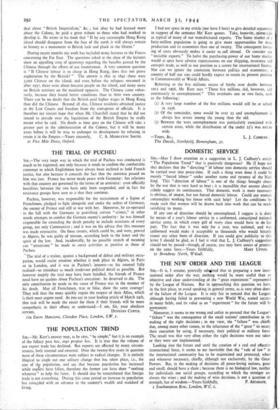THE TRIAL OF PUCHEU
Sta,—The very inept way in which the trial of Pucheu was conducted is much to be regretted, not only because it tends to confirm the comfortable contempt in which Englishmen have always been inclined to hold French justice, but also because it conceals the fact that the ,sentence passed on him was just. France has never made peace with Germany: her relations with that country are governed by theterms of an armistice: even officially hostilities between the two have only been suspended, and in fact the resistance groups have seen to it that they continue.
Pucheu, however, was responsible for the recruitment of a -region of Frenchmen, pledged to fight alongside and under the orders of Germany, the enemy of France and still at war with her. Moreover, he co-operated
• to the full with the Germans in punishing certain "crimes," in• other words attempts to combat the German enemy's. authority: he was himself responsible for extending the death penalty to include resistants of every group, not only Communists ; and it was on his advice that this measure was made retroactive. On these counts, which could be, and were, proved at Algiers, he was guilty of treason, according both to the letter and the spirit of the law. And, incidentally, by no possible stretch of meaning can "attentisme " be made to cover activities as positive as those of .Pucheu. .
The trial of a traitor, against a background of defeat And military,occu- pation, would excite emotion whether. it took place in Algiers, in Paris or in London, and it was in Pucheu's 'interest—as his counsel fully realised—to introduce as much, irrelevant political detail as possible. But however ineptly the trial may have been handled, the friends of France need have no qualms about Pucheu's execution: he deserved to die. The only contribution he made to the cause of France Was in the manner of
his death. May all Frenchmen, true or false, show the same courage! They .will thus the more quickly regain the respect of their Allies, which
is their most urgent need. As you say in your leading article of March 24th, that task will be made the easier for them if their friends will be more sympathetic in their efforts to understand.—I am, Sir, your obedient






















 Previous page
Previous page